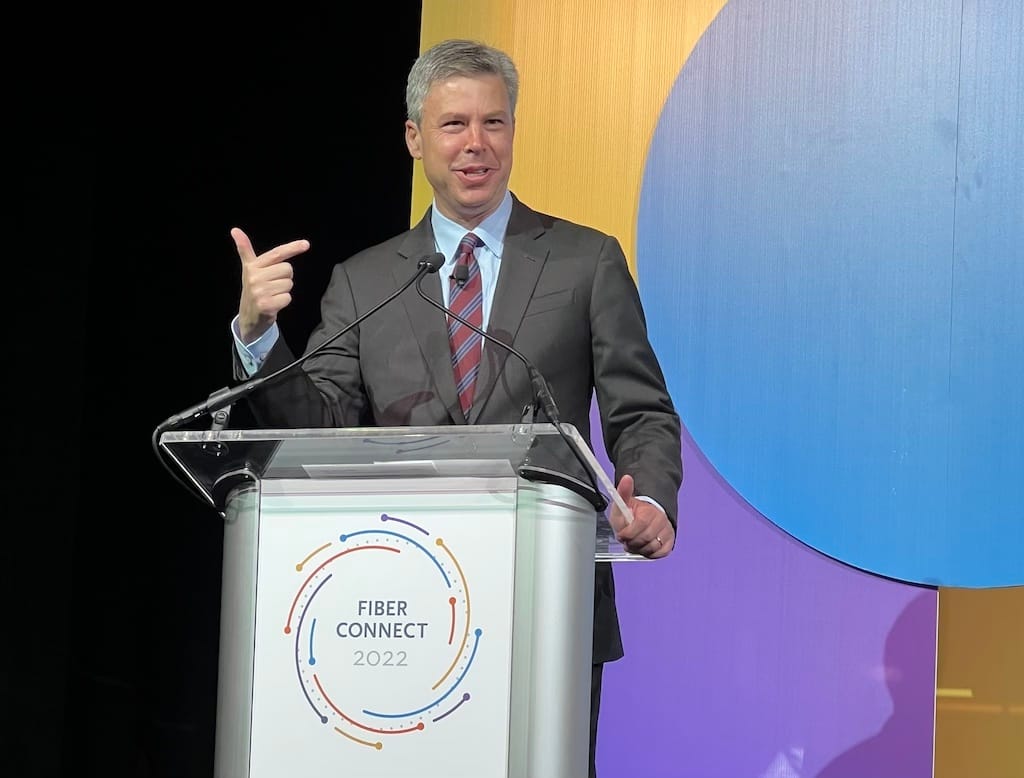NTIA Official Acknowledges Clear Preference for Fiber in Infrastructure Deployment Program
Attendance at the fiber show jumped from 2,041 attendees last June to 2,854 registrants as of Friday.

NASHVILLE, June 13, 2022 – A Biden administration official working on broadband infrastructure deployment said Monday that he wasn’t afraid to explicitly state that the U.S. Commerce Department favors fiber over other technologies.
“You will see that we have clearly expressed a preference for fiber,” said Andy Berke, who enjoys the title of “Special Representative for Broadband” at the National Telecommunications and Information Administration, the Commerce Department agency responsible for broadband funding.
“Fiber is future proof. If we put something in the ground, we know we are only going to have to put in the ground once.”
Berke was speaking at the kickoff of Fiber Connect here, the trade show of the Fiber Broadband Association. Attendance at the show jumped from 2,041 attendees last June to 2,854 registrants for this year’s conference as of Friday.
Fiber Broadband Association CEO Gary Bolton used his welcoming remarks to take a victory lap for the association.
‘If it’s not fiber, it’s not broadband’
“The market and our government have finally come to the conclusion that if it’s not fiber, it’s not broadband,” referring to the technology-specific tag line of his trade association.
Following the passage of the Infrastructure Investment and Jobs Act in November 2021, Bolton said, his group went to work crafting the a “playbook” for deployment of broadband that was issued jointly by the Fiber Broadband Association and NTCA, the Rural Broadband Association.
Issued in March, Bolton said that he and NTCA are working to update the playbook based upon specific guidelines released by the NTIA in the notice of funding opportunity for the Broadband Equity, Access and Deployment. Those were released in May.
“While the NTIA NOFO was a huge victory for fiber broadband, the fight is far from over,” Bolton continued. “The rules are in our favor, but we need to work diligently with every state and every territorial broadband office and state policymaker to make sure that the nation’s broadband infrastructure is built with future-proof fiber.”
As mayor of Chattanooga, Berke touted the gigabit city
Berke, who hails a few hours down the road from Chattanooga, Tennessee, came on stage soon after Bolton finished.
As mayor, he led Chattanooga to become the first city in the country to offer symmetrical gigabit per second broadband service — available via fiber-optics — to every resident.
That service was offered by EPB, a subsidiary of the city’s municipal power provider.
Questioned about whether the agency was “starting to see some pushback about the preference for fiber,” Berke said that BEAD funds won’t go exclusively for fiber builds.
“The geography of Alaska and the density of Alaska are a lot different from Rhode Island,” Berke replied.
In spite of NTIA’s preference for fiber, it will be up to state broadband officers to make final decisions about which technology providers will receive their BEAD sub-grants. “It is not about the technology. At the end of the day, it is about being good stewards of the taxpayer’s money.”
“If we do it once” with fiber, the Biden administration will “save the taxpayers from having to do it again” in future years, Berke said.
U.S. senator from Tennessee makes an appearance
U.S. Sen. Bill Hagarty, R-Tenn., also came on stage and addressed the audience the briefly.
Hagarty, one of 30 Republicans to vote against IIJA in August 2021, acknowledged “concerns” about the measure, but also said that it represented a “tremendous opportunity.”
“The pandemic has underscored how critical broadband access is,” he said.
Correction: An earlier version of this story misstated the amount of Fiber Connect attendees in 2021. The number was 2,041, not about 1,500. The story has been corrected.











Member discussion